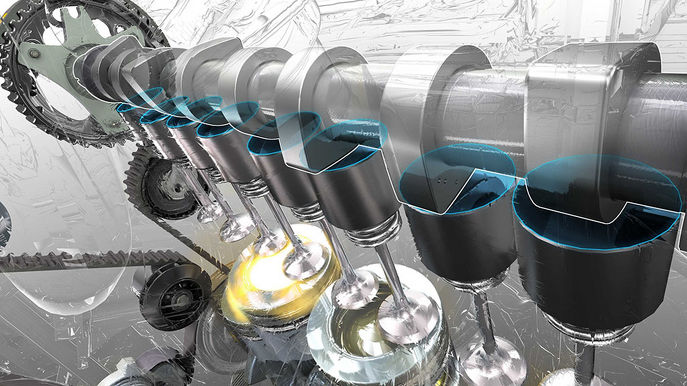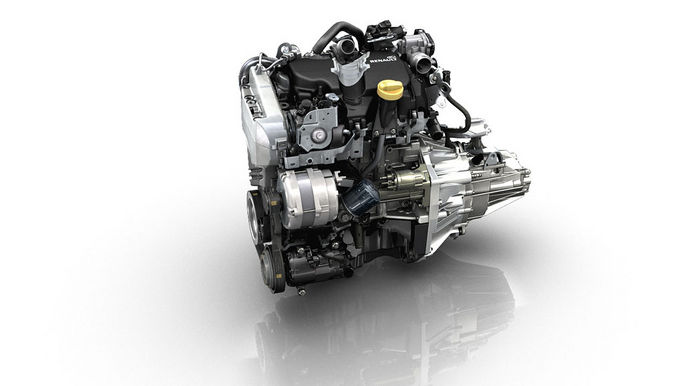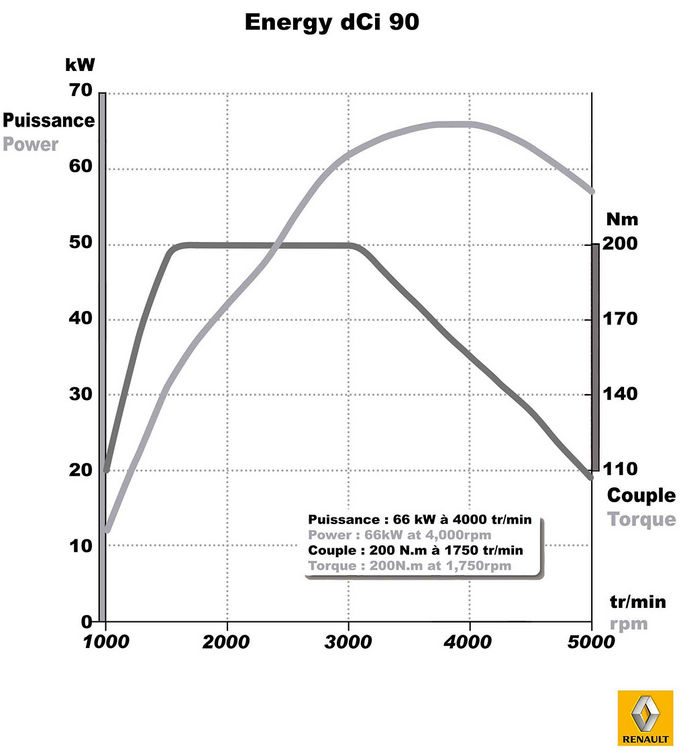Kangoo establishes new fuel consumption record with new ‘Energy’ engines

- In the wake of the launch of Kangoo Z.E. at the end of 2011, the internal combustion-engined version of Renault Kangoo is back in the news with the introduction to the range of two new engines - Energy dCi 90 and 75.
- With these two engines under the bonnet of the PC and LCV versions of Renault Kangoo, the model sets a new fuel consumption record of 4.4 litres/100km (equivalent to 115g of CO2/km[1]) to emerge as the most frugal vehicles in their respective classes ('ludospace' and small van).
- Oil change intervals have been extended to every 40,000km/two years, instead of every 30,000km/two years, the longest in the engine's class. In total, running-cost savings amount to 14 percent.
- Kangoo is the first model to offer Energy dCi 90 and 75 engine versions, thus bringing the technological excellence of Formula 1 to the world of road vehicles.
- Kangoo Energy dCi 90 will be on display at the Geneva Motor Show and is poised to go on sale in France this March, with pre-tax prices for Kangoo Express starting from €16,350 and tax-paid prices for Kangoo starting from €19,300. The 75-horsepower version will be available in April.

The 2012 Geneva Motor Show will see Renault showcase its celebrated ludospace fitted with the brand new Energy dCi 90 diesel engine. With this technologically-advanced version of the Energy dCi 110 under the bonnet, both the ludospace (Kangoo) and van (Kangoo Express) versions of the model stand out as the most frugal in their class in terms of fuel consumption and CO2 emissions.
Kangoo Energy dCi 90 and 75 returns record low NEDC combined-cycle fuel consumption of just 4.4 litres/100km, that's equivalent to 115g of CO2/km1. The two new engines also contribute significantly to lower running costs. In addition to the appreciable 16 percent fuel saving, oil change intervals have been extended to every 40,000km/two years, instead of every 30,000km/two years, the longest in the engine's class. Depending on national fiscal policies, business customers and ordinary motorists alike can benefit from CO2 emissions-related tax reductions in certain countries, too. In France, for example, the new engines available for Kangoo qualify for lower company vehicle road tax. In total, running-cost savings amount to 14 percent, a figure which business customers will find particularly attractive.
To achieve this result, the current 1.5 dCi 90hp and 75hp engines have undergone a significant metamorphosis with the incorporation of the technological DNA of the Energy dCi 110 powerplant which already stars in the Mégane and Scénic catalogues. The Energy dCi 90 and 75 are packed with advanced technology, including features that stem from Renault's presence in Formula 1. For example, the DLC-coated cam followers use a technique (Diamond Like Carbon) that has been employed in motor racing for some years. The mechanical properties of DLC significantly reduce friction and improve energy efficiency to deliver enhanced performance and contained fuel consumption.
|
Energy dCi 90 and 75 - Technical Characteristics in brief: |

The latest diesel engines also come with ESM (Energy Smart Management) braking/deceleration energy recovery, plus latest-generation Stop&Start developed specifically to enhance driver and occupant comfort thanks to the following benefits:
- no undesirable cutting of the engine in slow-moving traffic: the vehicle's speed must exceed 4kph before the Stop&Start system is re-triggered following a stop,
- no fluctuations in cabin temperature, while the audio/navigation systems do no switch off,
- less noise, since the ventilator fan speed is reduced when the engine stops.
The vehicle's dynamic credentials are as eloquent as ever with the latest engines. Peak torque of the 90hp version is 200Nm, which is available from 1,750rpm for genuine driving pleasure and which provides crisp reacceleration from very low revs. Maximum power of the Energy dCi 75 version is 75hp, with maximum torque of 180Nm available from 1,750rpm.
Prices in France
| KANGOO PC | Authentic Energy dCi 90 |
Expression Energy dCi 90 |
Privilège Energy dCi 90 |
TomTom Edition Energy dCi 90 |
| Tax-paid prices (€) | 19,300 | 20,800 | 21,500 | 22,200 |
| KANGOO LCV | Confort Energy dCi 90 |
Grand Confort Energy dCi 90 |
Extra Energy dCi 90 |
| Pre-tax prices (€) | 16,350 | 17,350 | 17,550 |

The release of this new engine marks the beginning of a new phase in the company's powertrain strategy which seeks to make Renault the number one brand in Europe with regard to CO2 emissions thanks not only to the incorporation of new technologies for its internal combustion engines, but also to the development of a range of electric powertrains. This offensive took concrete form last year with several launches of new engines which combine fuel-efficiency and performance. The introductions of the Energy dCi 90 and 75 take the number of engines in the current Energy range to seven.
Renault Energy engines in brief:
|
Renault vans: still in a class of their own
Following last October's launch of Kangoo Z.E., which was voted International Van of the Year 2012, Renault's vans continue to make news thanks to a range of innovative, more environmentally respectful engines with the arrival of the brand new Energy dCi 90.
Since 1998, the brand has notably succeeded in defending its lead in the European small van market thanks to the development of specific innovations, either especially for LCVs, or initially seen on its vans: from the hinged rear roof flap and sliding side doors to electric vehicles and the Energy range of engines.
Diskusia k článku
Najnovšie galérie
































 Pavel
Pavel 
 Tomáš
Tomáš 
 Kenneth
Kenneth 
 Kamil
Kamil  Csaba
Csaba